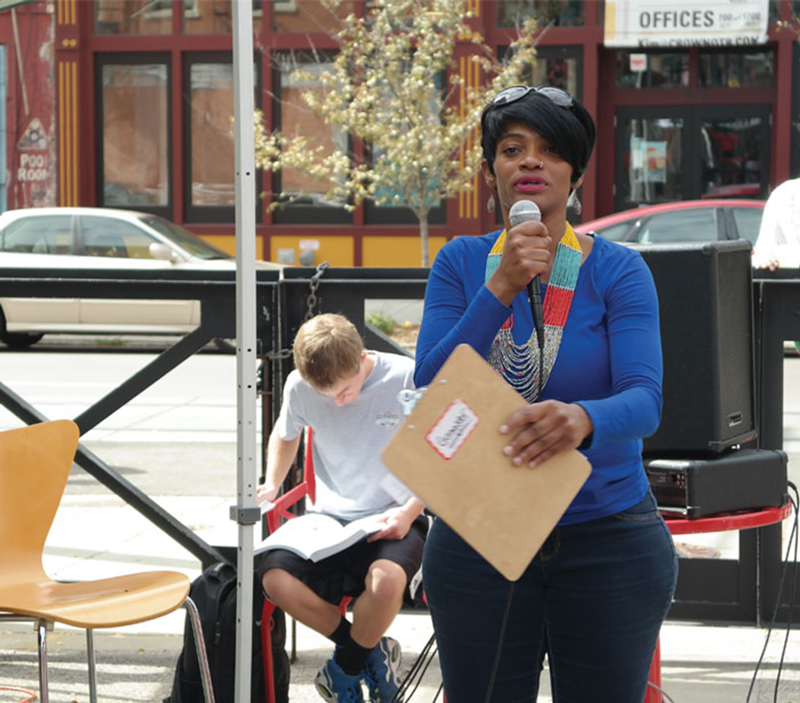For more than 160 years, Findlay Market has been a place for community interaction and education in Cincinnati. It has been the scene for good times and hard times, and has been a cultural gathering place for the residents of Over-the-Rhine and beyond. In an effort to celebrate the market and the stories it has inspired, Karen Kahle, director of communications and programs for the Corporation of Findlay Market, has started a new cultural event. The Findlay to the People Storytelling Series, a monthly event that began in August, works to facilitate conversations around the local landmark through the stories of its merchants and community.
The event was originally set up as a panel of invited speakers, but organizers felt that was too formal. “That wasn’t what we wanted,” says Jai Washington, community connector for Cincinnati and emcee of the series. “We wanted this sort of community-based engagement.” Washington describes how the panel became three speakers on stools, which evolved again into individual speakers telling their personal stories.
According to Kahle, Findlay Market represents the struggles of OTR over the past few decades, especially as the Queen City has grown and changed. “We think it’s important, and so many issues are contained in the little project around diversity, change, gentrification, small businesses and sustainability,” she says. “And what (better) way to bring attention to those issues than through stories?”
These stories, which have covered everything from financial struggles to personal victories, have brought to life the human element of Findlay Market. Findlay merchants, community members and local publications have been pulled into the conversation as the series progresses, covering themes like “generations,” “organic” and “global.”
“I think we kind of pulled from a wide base of constituencies,” says Kate Zaidan, second-generation owner/operator of Dean’s Mediterranean Imports and one of the series’ organizers. “We have shoppers, we have long-term residences of Over-the-Rhine, we have merchants. I think part of the idea was to try to bring in all the different people who enjoy the market and who sort of feel some ownership over it.”
Washington notes that audience participation varies as the series progresses. Some actively engage in the conversations; others prefer to just listen. “These explorations of these stories and how they’re delivered offer people various ways to engage, based on their comfort level. You get questions sometimes, sometimes you don’t,” she says.
Findlay Market is the perfect scene for sharing stories, says Washington, calling it “Cincinnati’s original incubator.” “For me, the market is one of the prime examples of what community engagement — diverse marketplaces, I mean — looks like,” she says. “To celebrate those stories reminds people who have been here. It also encourages people who are new here to understand the dynamics of the neighborhood, offering them an opportunity to become involved and a part in the story.”
Zaidan agrees, adding that the market has always created an interactive social experience. “We have the advantage of 160 years of history and culture,” she says. “We’ve sort of been established as a gathering point in Cincinnati for a very long time. It’s not that difficult to sort of build on what’s already there, and that, I think, is a huge advantage.”
The event, going on its fourth month, started as a panel of speakers, but quickly evolved into a more immersive setting that focused on one speaker at a time, as well as spurring an open dialogue among speakers and the audience. “People connect in a way that — it’s the least offensive way to the palate,” Washington says. “It’s kind of like music — it’s this way where we all can get a story out without people being immediately offended, because the understanding is that you’re coming from personal perspective.”
“As the program evolves, we’re learning that not everyone wants to be actively participating in the conversation, but that doesn’t make it any less relevant.”
November’s FINDLAY TO THE PEOPLE STORY-TELLING SERIES takes place 1-3 p.m. Sunday. More info: findlaymarket.org.


